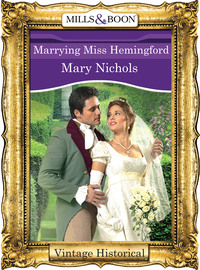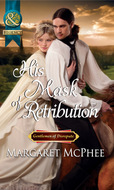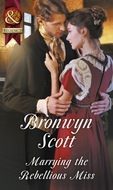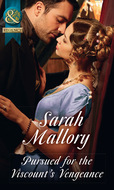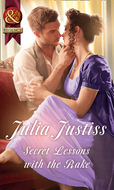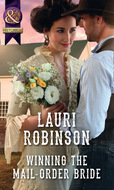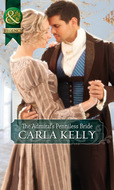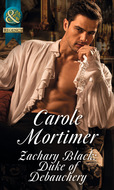Książki nie można pobrać jako pliku, ale można ją czytać w naszej aplikacji lub online na stronie.
Czytaj książkę: «Marrying Miss Hemingford»
“Dr. Tremayne, thank you for coming.”
Anne could almost believe he was a gentleman. One whose coat was three years out of fashion, but a gentleman for all that.
“My aunt wishes to consult you.” Anne smiled. “You must have made an impression on her, though I cannot think why when she was in a dead faint most of the time.”
He looked as though he were about to laugh, but then he pulled himself together. “Miss Hemingford, are you bamming me?”
“Indeed, I am not. I would not presume on so short an acquaintance.”
He wondered if she would do so on a longer acquaintance, and he allowed himself to imagine them teasing each other, laughing together, happy in each other’s company. But, suddenly remembering Sophie, he brought himself back to reality.
MARY NICHOLS
Born in Singapore, Mary Nichols came to England when she was three, and has spent most of her life in different parts of East Anglia. She has been a radiographer, school secretary, information officer and industrial editor, as well as a writer. She has three grown-up children and four grandchildren. Marrying Miss Hemingford features characters you will have already met in The Hemingford Scandal.
Marrying Miss Hemingford
Mary Nichols

MILLS & BOON
Before you start reading, why not sign up?
Thank you for downloading this Mills & Boon book. If you want to hear about exclusive discounts, special offers and competitions, sign up to our email newsletter today!
Or simply visit
Mills & Boon emails are completely free to receive and you can unsubscribe at any time via the link in any email we send you.
Contents
Cover
About the Author
Title Page
Chapter One
Chapter Two
Chapter Three
Chapter Four
Chapter Five
Chapter Six
Chapter Seven
Chapter Eight
Chapter Nine
Chapter Ten
Copyright
Chapter One
1815
The funeral cortège was a long one; the old Earl of Bostock had been respected, if not greatly loved, in the Lincolnshire village from which he took his name. He had lived to a great age, over eighty, so it was said, and had outlived wife and sons, and the only family left to mourn were his grandson Harry, now the new Earl, Harry’s wife, Jane, and his twin sister, Anne. She, most of all, mourned the passing of her grandfather. In his latter years the Earl had become almost a recluse, irascible, opinionated and intolerant where everyone but his beloved granddaughter was concerned. She had been the apple of his eye, the joy of his old age and his constant companion. And now he was gone.
Anne watched from the window as the coffin, on its carriage drawn by black plumed horses, left Sutton Park, followed by other carriages containing male members of the family, some of whom were so distantly related she had never met them before. Behind them in the procession were many of her grandfather’s friends and close associates. The day was overcast, cooler than of late and threatening rain, though none as yet had fallen. It was a day in keeping with the sombre occasion.
Anne turned as her aunt came into the room. ‘I thought he would live for ever,’ she said, giving her a wan smile. ‘I cannot believe he has gone.’
‘We all have to go sooner or later.’ Although she was forty, Georgiana Bartrum still had the petite figure of a girl; her features were unlined and her hair was still raven black and topped by a lace-edged black cap. ‘Be thankful that he lived so long…’
‘I wish I could have gone to the funeral, seen him laid to rest.’
‘My dear Anne, you know ladies do not go to funerals.’
Anne sighed, doing her best not to weep; Grandfather would have considered it a weakness. ‘I don’t feel like a lady, I feel like a little girl, lost and bereft.’
‘I know, my dear, but that will pass in time.’ Her voice faltered and Anne went at once to put her arm round her.
‘Oh, Aunt Georgie, I am so sorry, I did not mean to make you sad too.’
Her aunt, her mother’s much younger sister, was herself in mourning for a beloved husband who had died suddenly eighteen months before, but, on hearing of the demise of the Earl, had come down from the Lake District for the funeral, determined to put her grief aside for the sake of her niece. ‘You must not wish the old Earl back,’ she said, dabbing at her eyes with a wisp of handkerchief. ‘He was a great age and could do nothing for himself at the end. He is with his wife and your dear mama and papa now and you must think of yourself.’
Her aunt had put her finger on the problem. Twenty-seven years old and unmarried, Anne could not contemplate her future with equanimity. Harry and Jane wanted her to make her home with them, but though she loved them dearly, she did not think it would serve. Ape leader, old maid, maiden aunt were words that leapt to her mind. Why had she turned down every offer of marriage made to her when she was still young enough to be thought marriageable? Not quite every offer—there had been one she would have accepted from a perfectly eligible young man with whom she had imagined herself in love. They had been dealing famously with each other and she had been expecting an offer.
And then her brother, serving as a very young Hussar lieutenant, became involved in the scandal over Mary Ann Clarke, the Duke of York’s one-time mistress, who had been using her influence with the Duke to sell promotions. It had been unpleasant at the time, but it had all blown over, although not before the gentleman in question had decided to beat a hasty retreat. Grandfather had said if he was so easily blown in the wind he was not worthy of her, which had been small comfort at the time.
That had been five years ago and since then she had been wary and refused every offer. Those who came after had not been ineligible, ugly or cruel, and yet she had rejected them all. She had made excuses not only to them but to herself: her grandfather was old and ill and could not manage without her; she looked after his household, wrote letters for him, read to him, ran errands and even fed him when he became too feeble to feed himself. She had also assumed the charitable duties on the estate and in the village that her mother would have done had she lived. And now it was too late; her grandfather was dead and she was well past marriageable age.
Now no one needed her. Jane was easily able to fulfil the task of the lady of the manor, though she pretended she would need Anne’s help. But Anne could not while away the remainder of her life, doing embroidery and being a companion to her sister-in-law, however much she loved her. She loved her little nephew too, and therein lay much of her unease. She longed for children of her own with a fierce passion that made her miserable, and seeing little William, toddling about on his unsteady two-year-old legs, giggling when she held out her arms to catch him, made her want to weep. She had to make a life for herself, a life that she would find fulfilling, so that her lack of children did not become an unhealthy obsession.
‘But what am I to do?’ she asked her aunt. ‘My usefulness is at an end…’
‘Nonsense! You have your whole life before you. We must find you a husband—’
‘Husband! At my age!’ Anne gave a cracked laugh. ‘Who would have me?’
‘We shall have to see, shall we not?’
‘Aunt Georgie, I do hope you are not scheming on my behalf, because I tell you now it will not work. I am not beautiful, I am too outspoken and independent and have had my own way far too long…’ Like her grandfather, she was passionate about things she cared for, could not tolerate fools, hated fops, could not abide idleness and had a fiery temper when roused.
‘None of which is an impediment that I can see.’
‘An impediment to what?’ Jane had entered the room, carrying a squirming William in her arms. The child was in a bright blue dress, which made a sharp contrast to the sombre gowns of the women. He held out his arms to Anne, who took him and sat down with him on her lap, rubbing her cheek against the silky softness of his hair.
‘Marriage,’ Anne said. ‘Aunt Bartrum thinks she can find me a husband.’
Jane stood and looked at her sister-in-law, while William nestled his head into Anne’s shoulder and began to suck his thumb. Anne was tall and graceful; she was not pretty so much as classically beautiful. Her rich brown hair and amber eyes were her greatest assets. Jane had often wondered why Anne had never married, why she had allowed the old Earl to impose on her so much. He had an army of servants to help him; she need not have made herself his dogsbody. Was she perhaps afraid of matrimony? ‘Do you want a husband? You always said you did not want to marry.’
‘It was Aunt Bartrum’s idea, not mine.’
‘I hope you do not think that you have to leave here, Anne,’ Jane said. ‘This has always been your home and it always will be. I should feel mortified if you thought otherwise. Whatever would we do without you?’
‘Manage very well, I think,’ Anne said, pretending to laugh. ‘But there is nothing for me to do here, nothing important, that is. No raison d’être.’
‘Fustian! You are you, my friend, my dear sister, my bulwark. There are any number of things for you to do. You are simply feeling a little low.’
‘And that is why I propose to take her away and provide a little diversion,’ Mrs Bartrum put in. ‘Anne needs to see that there is more to the world than Sutton Park and its environs. Why, she did not even go to London for the Season this year…’
‘Grandfather was too ill to be left,’ Anne put in.
‘That I grant you, but now you must take stock and I do not think you can do it here.’
Anne gave a shaky laugh, recognising the truth of this. ‘But there is a great difference between providing a little diversion and finding me a husband, don’t you think?’
‘One may lead to the other.’
‘But the Season is over,’ Jane said, taking William from Anne and handing him to his nurse, who had come to fetch him. ‘There will be no one in town now.’
‘And I am long past playing the field among the eligibles of the ton,’ Anne said, watching the nurse disappear with her burden, her heart aching to have her own child in her arms. Could she marry for the sake of having a child? Why hadn’t she asked herself that question years before when it might have been a possibility? ‘For goodness’ sake, I had my come-out ten years ago.’
‘I do not propose going to town,’ Mrs Bartrum said. ‘I had thought of going to Bath, but that is old fashioned and full of dowagers and bumbling old men and, though I am content to live quietly and remember the happiness I once had, that will not serve for you. We need to find some life. We’ll go to Brighton.’
‘Brighton?’
‘Yes, there are all manner of diversions there and good company. Now the war is ended, there are army officers and naval men and half the beau monde down from London…’
‘Rakes and demi-reps,’ Anne said. ‘Hanging on to the coat-tails of the Regent.’
Her aunt laughed. ‘But very diverting rakes and demi-reps.’ Seriously, she added, ‘They are not all like that. I know many who are honourable gentlemen and ladies who go to take the water and are perfectly respectable. We can avoid the disreputable. I intend to go and I need a companion…’
‘But I am in mourning, I cannot go out and about in society…’
‘Oh, yes, you can,’ Jane said, suddenly realising that was just what Anne needed to fetch her out of the dismals. ‘You know perfectly well it was Grandfather’s express wish that you would not put on mourning for him and how do you obey him?’ She looked at the heavy black silk gown Anne wore, with its jet buttons and black lace edging. ‘By resorting to black without a speck of colour and it certainly does not become you.’
Her grandfather had indeed instructed her not to go into mourning for him. ‘You have given up your youth for me,’ he had said the day before he died. It had been a great effort to speak, but he would not be silenced. ‘It was selfish of me to allow it, but when I hand in my accounts, I want you to feel carefree and happy. Cheer if you like.’ He had smiled at her protests. ‘I mean it. Do all the things you have missed. Will you do that?’ She had promised to obey him. And she would, but not today. Today she felt too sad and her black clothes were in keeping with her mood. ‘I know,’ she told her sister-in-law. ‘But I could not wear colour today.’
‘No, but you can tomorrow. I know you have a light mauve that would be entirely suitable. And there is that cream muslin and a grey jaconet which are not vivid at all. I shall ask Harry what he thinks.’
‘As if Harry had the first idea about ladies’ fashions! Why, he is guided by you even to what he wears himself, otherwise I declare he would wear a pink shirt with a bright orange waistcoat.’
The jest lightened the atmosphere a little and they settled down to take tea while they waited for the men to return, when a more sumptuous spread would be offered. Anne, sipping her tea, was thoughtful. Should she accept her aunt’s offer? It might give her time to reflect on what she should do: stay at Sutton Park being a maiden aunt to William and any other children who might arrive, until they grew up and left the nest and she became old and crotchety before her time, or venture into the world and see what it had to offer? She had still made no decision when the room was suddenly filled with men, all talking at once.
‘He had a good send-off,’ Harry said, joining his wife. ‘And the whole village turned out to see the coffin go by. They stood in silence with heads bowed. I was deeply moved.’
Servants appeared with trays of food and full glasses and nothing was said about Anne’s future until after the will had been read, the food eaten and the mourners had either departed for their own homes nearby or retired to the rooms allotted to them.
‘I am relieved that it went well and the old man is at peace,’ Harry said, folding his long legs into a winged chair by the hearth.
‘I could not rid myself of the feeling that he was in the room, watching and listening,’ Anne said. ‘And I cannot for the life of me think why he should leave me so much money. My needs are simple…’
‘Anne, my love, you have earned every groat of it,’ Harry said. ‘And I certainly do not begrudge it.’
‘I have no doubt it was meant in place of the dowry you would have had,’ Jane put in. ‘Now, you can please yourself how you spend it.’
‘Then I think I shall go to Brighton with Aunt Georgie.’
Harry demanded to know what she meant and, having had everything explained to him, said he thought it was a good idea. ‘We do not want to be rid of you, Sis,’ he said. ‘You know this is your home, but a change of scene will do you good. And Aunt Georgie too.’
Anne smiled. The spinster and the widow, what would Brighton make of them, she wondered.
It took three weeks to make all the arrangements, not only because a suitable house had to be found to rent, but also because Anne was, in some ways, reluctant to leave home and family, almost afraid of what was in store for her, which she recognised as foolishness. She was a mature woman, elegant, intelligent, able to hold her own in any company, and she was still young enough to enjoy herself. That was what Grandfather had said, when leaving her that bequest. ‘My granddaughter has made a great sacrifice to stay and see me comfortably to my end and nothing I give can recompense her for that,’ he had dictated to the family lawyer, who read it aloud to the company after the funeral. ‘I do not want her to grieve for me. I command her to be happy in any way she can and if this bequest can bring that about, then I hope she will make good use of it.’
She had cried then; only the second time she had shed tears since his death. The first had been when the doctor had pronounced life extinct and closed the old man’s eyes. She had been unable to hold back her grief and stood encircled in her brother’s arms, soaking his coat with her tears. The weeping was done now and she was going to do her best to obey his dying command. A few weeks in Brighton with her aunt and then she would think of her future.
They set off for London by post chaise, accompanied by Susan, Aunt Bartrum’s maid, and Anne’s middle-aged companion cum maid, Amelia Parker. They stayed at the Hemingford town house to do some shopping and completed their journey two days later, arriving in Brighton early on a Wednesday afternoon in late August.
The house they had taken was on the west side of the old town, in an area which had not so many years before been open fields, but since Brighton had become fashionable it was being developed at a frantic pace to keep up with the demands of the people who wanted to come and stay. Now there were elegant terraces of tall narrow buildings with biscuit-coloured façades and cast-iron balustrades. The one Mrs Bartrum had taken had a staircase that wound up from an entrance hall in decreasing squares to the upper rooms and which, viewed from the ground floor, reminded Anne of a dimly lit tower. But the rooms that led from it were light and airy with balconied windows at the front, which afforded a view of the sea, calm and sparkling on the afternoon they arrived.
‘First things first,’ Mrs Bartrum said when they had chosen their rooms and left the maids to unpack. ‘We will have some refreshments, give instructions to the servants about how we like them to go on and then we will go and announce our arrival.’
‘Announce it?’ Anne queried, laughing. ‘Are you going to send out the town crier?’
‘No, you foolish girl. We go to Baker’s library and sign the visitors’ book and while we are there we will read the names of those who have preceded us. After that, home for dinner and then we shall see what tomorrow brings.’
Baker’s library was on The Steine at the bottom of St James’s Street and they decided to walk. Putting a light shawl over her lilac silk gown, Anne slipped her arm through her aunt’s and they stepped out briskly along the sea front. Anne had never known such a dazzling light. It glittered on the sea, shone on the pastel stucco of the buildings, reflected in the windows and picked out the colours of other strollers’ clothes like an artist’s palette. And the air was so clear, they felt almost giddy with it.
‘Shall you bathe in the sea?’ Anne asked her aunt, noticing the row of huts on wheels that stood along the water’s edge and the women standing beside them holding armfuls of cotton garments for bathers to change into.
‘Why not?’ her aunt said. ‘There is no sense in coming to the seaside if you do not take a dip, is there?’
Anne smiled. Her aunt was game for anything. ‘No, I suppose not.’
‘We’ll go one morning very early before anyone is about, then if we find we do not like it, we can come out and no one the wiser.’
‘What else have you in mind for us to do?’
‘That depends on the Master of Ceremonies. He will advise us what is going on and what is most suitable for us. That is why we sign the visitors’ book: it tells him we are here.’
Anne found herself laughing. ‘You mean he is a kind of matchmaker?’
‘Not at all.’ She paused. ‘Unless you want him to be, then of course he will make sure you are introduced to the right people.’
‘I positively forbid you to speak of me, Aunt. I will not be paraded like a seventeen-year-old newly escaped from the schoolroom.’
‘I would not dream of it, my dear. There is no need.’
Anne looked sideways at her. Her aunt was looking decidedly complacent and she wondered just what she was up to. She felt no alarm; let the dear lady have her fun, for that was all it was. A diversion, wasn’t that what she had said?
Even in the old part of town, there were new houses interspersed with old and Anne began to wonder what the original fishing village had been like fifty years before and what had become of its inhabitants. There must still be fishermen, because their nets were laid out to dry on a wide grassy bank next to the sea and one or two boats were pulled up at the water’s edge, but of their owners there was no sign. She supposed they set out very early in the morning and, once their catch had been landed and sold and the nets put out to dry, disappeared for a well-earned rest.
They picked their way over the nets and found the library where Mrs Bartrum spent some time perusing the visitors’ book and making notes, while Anne borrowed two books, then they set off to explore a little further. They wandered up Old Steine, looked at the house where Mrs Fitzherbert, the Regent’s mistress, lived and a little further on came to the Pavilion, his seaside home. It had begun as an ordinary villa and had been extended and glorified over the last twenty years until it looked like an Eastern palace, with white painted domes and colonnades, and it was still being altered and embellished. ‘At least, it gives work to the people of the town,’ Anne said, as they moved away.
They returned home by way of North Street and Western Road and sat down to a dinner of fillets of turbot, saddle of lamb and quince tart. Mrs Carter, their cook, was a find, but then the agent had only to mention the Earl’s name and the best was forthcoming, be it house, servants or horses. They had hardly finished their meal and settled in the drawing room with the tea tray when the Master of Ceremonies was announced.
Dressed very correctly in dark breeches and white stockings, long tail coat and starched muslin cravat, he came in, bowed and was offered tea, before anything was said of the purpose of his visit. Anne suppressed her curiosity and waited.
‘Now, madam,’ he said at last, producing a sheaf of papers from a bag he carried. ‘I have here a list of next week’s events. There is a ball at the Castle Inn Assembly Rooms on Monday and a concert on Tuesday. The Old Ship has a ball every Thursday, and there are several lectures and, of course, the usual games of whist in the afternoons. But I see you are in mourning, so perhaps…’
‘I am, sir,’ Mrs Bartrum said. ‘And shall be until the end of my days when I shall hope to join my dear husband in heaven, but that is nothing to the point. My duty is clear to me and that is to put aside my grief…’ she dabbed at the corners of her eyes with her handkerchief ‘…for the sake of my niece. She is my only consideration. We intend to join in with whatever activities you deem suitable. My niece, as no doubt you have realised, is unmarried.’
Anne thought she was long past blushing, but this statement sent the colour racing to her face and she gave her aunt a disapproving look, before she set him straight by saying. ‘But not, sir, in need of a husband.’
‘I understand,’ he said, looking at Anne and smiling knowingly, which made her squirm, though she held her tongue for the sake of her aunt.
He stayed long enough to go through other events on offer and ticked off those they decided to attend, then took his leave.
‘Aunt, I am very displeased,’ Anne said as soon as they were alone again. ‘I asked you not to make an issue of my being unmarried. Now he thinks you want him to find a match for me.’
‘I simply stated that you were single,’ her aunt said. ‘Besides, we can find our own company. I saw Lady Mancroft’s name is in the visitors’ book; she is an old friend of mine and knows simply everybody worth knowing.’ She rose from her chair. ‘Now I think I shall go to bed. The sea air has made me quite sleepy.’
Anne followed her a few minutes later and went to her own room, where Amelia helped her out of her dress and left her to finish her toilette alone. Once in her nightgown, she stood at the open window and looked out over the sea. The moon had tinged the horizon with gold, which played on the sea in a long jagged line, making it glitter like a jewelled necklace on dark velvet. She could hear the waves lapping on the shore, could smell the tang of salt and fish and seaweed. It was a very different world from Sutton Park, a magical world when anything could happen. She smiled as she turned away and climbed into bed. She was sure her aunt meant to find a match for her and though one-half of her resented it, the other half was tingling with anticipation, which was, she told herself severely, very foolish of her and could only lead to disappointment.
It was very early when she woke, and unable to stay in bed, she rose and dressed and went downstairs to find the maid preparing breakfast. ‘Mrs Bartrum instructed me to take breakfast to your rooms,’ she said. ‘I didn’t expect you down…’
She was obviously flustered and Anne smiled to put her at her ease. ‘Oh, do not mind me, I like to be up be-times. Take my aunt’s and Miss Parker’s up to her. I’ll have mine in the morning room, then I think I will take a stroll.’
She had long ago stopped worrying about having a chaperon everywhere she went and, half an hour later, she was walking along the sea front. There was a little more wind than there had been the day before, which tipped the waves with white foam, but in spite of this the bathing machines were doing good business.
They reminded Anne of gypsy caravans. They had four large wheels, which elevated them four or five feet from the ground, and were entered by a flight of steps at the back that had a kind of canvas hood. Once the bather was inside, she changed into the costume given to her by the attendant and the horse drew the whole contraption into the water where the vehicle was turned round, so that the bather could descend the steps straight into the sea, still under the shelter of the hood. Thus the proprieties were observed and none of the lady’s fine clothes were even dampened. Even at a distance Anne could hear the women’s shrieks as they immersed themselves. Further along the beach the same service was being offered to gentlemen bathers.
She carried on to The Steine, noticing that the fishermen’s nets and the boats had gone. There were sails on the horizon, but she could not tell what kind of boats they were, nor if they were coming in to land. Behind her the road was becoming busy; there were carriages and carts going about their business and pedlars setting up their stalls. What alerted her she could not afterwards say, but she turned suddenly to see a fast-moving curricle mount the walkway and clip a small child, sending her sprawling. Anne was running almost before the little one hit the cobbles. The curricle, driven by an army officer, went on without stopping.
The child could not have been more than five years old. She wore a flimsy cotton dress and very little else, no shoes, no coat. Anne fell on her knees beside her. She was unconscious and was bleeding from a wound to her head. Anne’s first fear that she might have been killed gave way to relief when she saw the slight chest moving. She looked around as if expecting help to materialise but though a crowd had gathered, no one seemed particularly helpful. ‘Does anyone know where she lives?’ she asked.
‘Take her to the poorhouse infirmary,’ said one. She could tell by his clothes that he was one of the gentry; he had a fashionable lady on his arm who shuddered in distaste and pulled him away. He went meekly, leaving Anne fuming.
‘There’s a doctor nearby,’ a young lad said, pointing towards an alley between tall narrow buildings. ‘You’ll know ’is place by the brass plate on the door.’
Anne scooped the child up in her arms and, supporting her head with one hand, hurried in the direction of the pointing finger. The little one, being half-starved, was light as a feather. ‘You will be fine,’ she murmured, hugging the child to her, though she was filthy and smelled of stale fish and her blood was seeping into Anne’s clothes. ‘The doctor will make you better and then I’ll take you home to your mama. Where do you live?’ She received no reply because the child was still deeply unconscious.
The alley was so narrow the sun could not penetrate it and there was hardly room for two people to walk side by side, but she was aware that the lad who had given her directions was pounding just in front of her. ‘Here it is, miss,’ he said, stopping beside a door on which was a painted notice announcing Dr J. Tremayne. Anne had her hands full and so he banged on the door for her with his fist.
It was opened by a plump woman in a huge white apron who immediately took in the situation. ‘Bring her in, bring her in,’ she said.
Anne followed with her burden as she was led along a corridor and into a room that was lined with benches and chairs, but no other furniture. In spite of the early hour, there were people waiting, old, young, crippled, deformed, all poorly clad, all grubby. She was about to sink into one of the chairs, when the woman said. ‘Better bring her straight through.’
She ushered Anne into an adjoining room, which was evidently the doctor’s surgery, for there was a bed, a desk with a lamp on it, two chairs and a large cupboard, most of it extremely shabby though perfectly clean. Of the doctor there was no sign.
‘Put her on the bed. I’ll fetch Dr Tremayne. He’s having his breakfast before he starts. They all come so early and he’d come straight from his bed if I didn’t insist he had something to eat and drink first.’
She disappeared and Anne gently laid the child on the couch. She was trying to staunch the bleeding with a towel she had taken from a hook on the wall, worrying that the little girl was so pale and lifeless, when she heard the door open and close behind her and turned to face the man who had entered.
Darmowy fragment się skończył.
